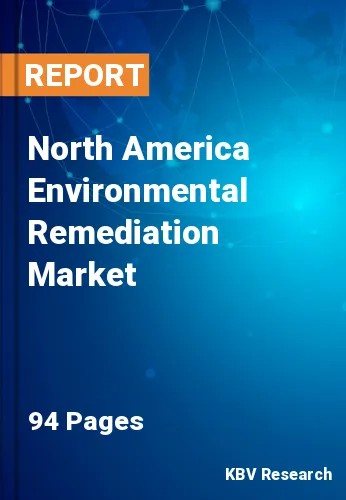The North America Environmental Remediation Market would witness market growth of 7.6% CAGR during the forecast period (2022-2028).
Soil remediation refers to the purification and revitalization of the soil. Many of the same variables that lead to groundwater pollution also lead to soil contamination. Soil and groundwater are frequently affected by the same cause and must be remedied together. Chemical spills, industrial activities, and the use of certain fertilizers and pesticides can contaminate the soil.
In addition to in-situ and ex-situ classifications, environmental remediation may also be classed as in-situ or ex-situ. Ex-situ remediation includes digging soil or sediment, treating it, and then restoring it to its original state. Solidification includes the addition of substances that bind to certain pollutants. Although this does not eliminate the toxins, it stops them from spreading to a larger region or potentially polluting the groundwater. For instance, a remediation project may combine contaminated soil with cement to create a solid block that traps pollutants and prevents rain from spreading pollution over a larger region.
Stabilization employs substances that chemically react with pollutants. By binding with pollutants and inhibiting their spread, these compounds modify the composition of the contamination, making it less harmful or simpler to control or remove. Stabilization is frequently employed for sites polluted with heavy metals like arsenic and mercury. Each phase of a cleanup project involves many sorts of labor. Managers manage each phase of the project. Environmental remediation professionals are experts in regulatory matters, cost assessment, and public relations.
The governments of several nations in the area, including the United States, have boosted expenditure in the pharmaceutical industry to expand the manufacturing of medications and sophisticated medical equipment. EPA released the National Recycling Strategy in November 2021 and maintained the objective of increasing the U.S. recycling rate to fifty percent by 2030. Consequently, it is projected that these factors will provide new growth possibilities for market participants engaged in the regional water quality monitoring systems which propel the growth of the environmental remediation market.
The US market dominated the North America Environmental Remediation Market by Country in 2021; thereby, achieving a market value of $44 billion by 2028. The Canada market is experiencing a CAGR of 10% during (2022 - 2028). Additionally, The Mexico market would exhibit a CAGR of 9.1% during (2022 - 2028).
Based on Site Type, the market is segmented into Private and Public. Based on Technology, the market is segmented into Bioremediation, Soil Washing, Phytoremediation, Excavation, Permeable Reactive Barriers, Chemical Treatment, Electrokinetic Remediation, Pump & Treat, Soil Vapor Extraction, Thermal Treatment, and In-situ Grouting & In-situ Vitrification. Based on Environment Medium, the market is segmented into Soil and Groundwater. Based on Application, the market is segmented into Oil & Gas, Manufacturing, Industrial, & Chemical Production/Processing, Automotive, Construction & Land Development, Agriculture, Mining & Forestry, Landfills & Waste Disposal Sites, and Others. Based on countries, the market is segmented into U.S., Mexico, Canada, and Rest of North America.
Free Valuable Insights: The Global Environmental Remediation Market is Estimated to reach $169.6 Billion by 2028, at a CAGR of 8.1%
The market research report covers the analysis of key stake holders of the market. Key companies profiled in the report include WSP Global, Inc. (Golder Associates), Clean Harbors, Inc., AECOM Corporation, Stantec, Inc., HDR, Inc., Tetra Tech, Inc., Jacobs Engineering Group Inc., DEME NV and BRISEA Group, Inc.
By Site Type
By Technology
By Environment Medium
By Application
By Country
Our team of dedicated experts can provide you with attractive expansion opportunities for your business.

